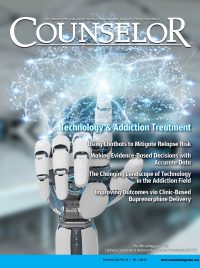Share
In addiction treatment, assessments are typically limited to drug and alcohol assessments with patients. While these drug and alcohol assessments are important, you may be wondering what they inevitably miss. Well, the missing element is patients’ strengths. The interesting thing is that we do add some measures of strengths in assessments and treatment plans if we utilize the SNAP method. SNAP stands for “strengths,” “needs,” “abilities,” and “preferences,” but even with this method we only scratch the surface of integrating patients’ strengths in their treatment plans.
What we really need in order to truly integrate patient strengths into our existing infrastructure is to incorporate recovery capital into formal treatment assessments. Recovery capital is an essential recovery vital sign, very similar in nature to other medical vital signs such as blood pressure and pulse. In order to detect this recovery vital sign, there is a recovery capital tool that encompasses SNAP and is vital to remedying the missing elements of recovery capital in treatment planning and assessment. This tool, developed by R1 Learning in partnership with Dr. David Best, uses evidence-based and best practice sets of recovery capital solutions, one of which is the recovery capital assessment (RCA).
The R1 RCA is a thirty-eight-question instrument for assessing individual recovery capital. It generates data for outcomes measurement and produces a real time care plan for recovery management. The R1 RCA calculates individual recovery capital via five evidence-based and validated assessment categories that quantify personal, social, and community components:
- Personal recovery
- Social recovery support
- Community recovery involvement
- Unmet needs (e.g., work/training/volunteering, service needs, housing, etc.)
- Acute barriers to recovery (e.g., risk-taking, substance use, criminal justice involvement, etc.)
These assessment categories help to identify immediate barriers to recovery while quantifying current individual strengths. It also provides a framework for individualized recovery capital growth planning, which is not only essential for treatment, but is the missing link when it comes to recovery outcomes. The R1 RCA is the only tool that can be used by individuals from prerecovery of the Substance Use Recovery Continuum to recovery maintenance (see Figure 1).

Measuring and tracking recovery capital helps to improve the mental health and quality of life of individuals in treatment, their social connections and relationships, the communities in which they live, and beyond. Previously, the measurement was either “quality of life” or “abstinence,” but with recovery capital it is possible to measure outcomes from harm reduction, abstinence, and/or medication-assisted recovery.
About Me
Pete Nielsen is the President & Chief Executive Officer for the California Consortium of Addiction Programs and Professionals (CCAPP), CCAPP Credentialing, CCAPP Education Institute, and the National Behavioral Health Association of Providers (NBHAP). CCAPP is the largest statewide consortium of addiction programs and professionals, and the only one representing all modalities of substance use disorder treatment programs. NBHAP is the leading and unifying voice of addiction-focused treatment programs nationally. Mr. Nielsen has worked in the substance use disorders field for 20 years. In addition to association management, he brings to the table experience as an interventionist, family recovery specialist, counselor, administrator, and educator, with positions including campus director, academic dean, and instructor.
Mr. Nielsen is the secretary of the International Certification and Reciprocity Consortium and the publisher for Counselor magazine. He is a nationally known speaker and writer published in numerous industry-specific magazines. Mr. Nielsen holds a Master of Science in Counseling Psychology and a Bachelor of Science in Business Management.











 Counselor Magazine is the official publication of the California Association of Addiction Programs and Professionals (CCAPP). Counselor offers online continuing education, article archives, subscription deals, and article submission guidelines. It has been serving the addiction field for more than thirty years.
Counselor Magazine is the official publication of the California Association of Addiction Programs and Professionals (CCAPP). Counselor offers online continuing education, article archives, subscription deals, and article submission guidelines. It has been serving the addiction field for more than thirty years.